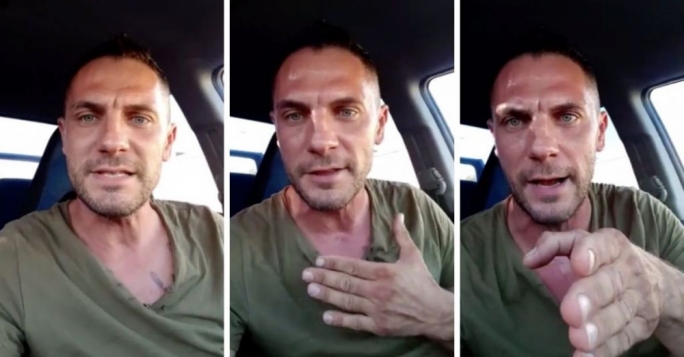
Racist sentiments are often classified as the ‘real’ feelings of ‘the people’, a daring protest against a superficial veneer of political correctness, as authentic voices of the silent majority. The anti-racist in contrast is typically construed as unwilling to understand these deep feelings. But is this so?
by Kathrin Schödel
Image by Andrea Piacquadio from Pexels
[dropcap]“[/dropcap]If we don’t take the anger being expressed by this man and people like him seriously, it’s going to keep festering with devastating results,” reads one of the Facebook comments which was used by Lovin Malta to underline the seeming importance of giving a platform to a racist video rant which went viral in Malta.
It seems to require the white man’s public anger as a trigger for a debate on migration, as Lovin Malta’s headline implies: “Whether You Agree With Ryan Or Not, Malta Seriously Needs To Discuss Migration And Integration”. In this way, expressions of enraged white men uttering racist sentiments are often interpreted as a seemingly necessary reminder that a discussion on migration needs to be started (have there been no discussions on the topic before?). And commentators take it upon themselves to emphasise this necessity while distancing themselves from ‘this man and people like him’, without making clear what is meant by ‘people like him’. Racists? People we should no longer describe as racists but who speak like racists? Lower class, less educated people than ‘us’?
‘We’—apparently—have the power to either take them seriously or dismiss them. Are ‘we’ media practitioners, or just non-racist, but sympathising middle class citizens? And who is meant by those not ready to take such utterances seriously? Those calling out racism? To take such a rant seriously seems to mean not to describe it in such terms.
‘Authentic Emotions’ vs ‘Virtue Signalling’
Racist sentiments are often classified as the ‘real’ feelings of ‘the people’, a daring protest against a superficial veneer of political correctness, as authentic voices of the silent majority. In the same context, the anti-racist in contrast is typically construed as unwilling to understand these deep feelings (and as a hypocrite not admitting his own racist views). From this viewpoint, racist prejudice appears as a ‘natural’ reaction of ‘the people’, while the anti-racist arguments smack of moral posturing. The feelings of the anti-racist seem to be secondary: the anti-racist is tasked with understanding the racist’s ‘authentic emotions’.
Treating racist prejudice as natural is a slippery slope. If racism is the authentic reaction, a perception of shared humanity, empathy and care for the other could be dismissed as moral posturing.
[perfectpullquote align=”full” bordertop=”false” cite=”” link=”” color=”” class=”” size=””]Treating racist prejudice as natural is a slippery slope. If racism is the authentic reaction, a perception of shared humanity, empathy and care for the other could be dismissed as moral posturing.[/perfectpullquote]
Such a discourse construes the emotions of the angry white man as more authentic than those of the anti-racist as well as those of the migrants and others at the receiving end of racism. The call for a debate of the racist’s emotions thus also casually excludes the voice—and feelings—of those attacked by his rant. It encourages a conversation between white racists and white non-racists, not one involving all those affected by migration and the racial logic of border politics, i.e. including people of colour, migrants, refugees. Their feelings, thoughts and interests are, it seems, not part of the necessary debate to be had either, or else they are something to be discussed by ‘us’, not an equal voice in itself. As ‘outsiders’, they are kept outside the conversation about them.

As it soon emerged after the video went viral, the “man […] genuinely scared for his family’s safety“ was not so genuine about the true dimension of the incident that allegedly sparked his emotions. The fact that he exaggerated the real basis for his rant is no coincidence: there is nothing particularly ‘genuine’ about racism. Focussing one’s worries and fears—about safety in public spaces, about economic security, about maintaining cultural traditions—on the black immigrant is not a spontaneous reaction. It is the expression of an ideological construct.
Diverting Anger, Searching for Scapegoats
The racist ideology involves looking away from existing hierarchies, not acknowledging who actually has the power to influence society and individual lives. It precludes from challenging, the real dangers threatening security and different ways of life.
It is true that a part of the population remains faithful to this ideology when about 14% name ‘immigration’ as their top ‘concern’ amid the spread of a fatal viral disease and the economic crisis which is coming in its wake. However, it requires some mental acrobatics to direct one’s focus to the racialised ‘other’ as the main issue, instead of governmental decisions or an economic system in which a crisis always means a severe crisis for the already less privileged and crisis mitigation for the affluent.
Racist views are clearly fuelled by statements and headlines such as “Isolated migrants to blame for spike in reported COVID-19 cases”, where the aim of distracting from the government’s bad decisions is blatantly obvious. Such arguments falsely construe a link between the spread of COVID-19 and sea rescue—where testing and isolating is carried out rigorously—and try to avoid a discussion on the lifting of travel restrictions for tourists and of social distancing measures in the name of ‘the economy’. It is through rhetoric like this that racism is stirred up and people’s attention is diverted from engaging with the real issues at stake.
[perfectpullquote align=”full” bordertop=”false” cite=”” link=”” color=”” class=”” size=””]Racist views are clearly fuelled by statements and headlines such as “Isolated migrants to blame for spike in reported COVID-19 cases”.[/perfectpullquote]
The survey quoted above, however, also shows that the concern about migration and foreigners living in Malta has gone down significantly since last year, which demonstrates that the fear of the racialised other is not an automatic reaction or a constant underlying feeling only superficially suppressed by political correctness. People rethink their concerns and are not passive carriers of predefined emotions. The media play an important role in framing these concerns and the possible solutions people envisage. The choice of topics the media focus on, the connections they make and the alternative outlooks they give space to all contribute to what is discussed in public and what remains unspoken, which voices are heard and which are excluded.
The biggest omission from most current public discussions is not the topic of migration itself, it is a radically critical debate of the economic system which creates the unequal world we live in and which affects both the lives of migrants and of residents negatively.
[perfectpullquote align=”full” bordertop=”false” cite=”” link=”” color=”” class=”” size=””]The biggest omission from most current public discussions is not the topic of migration itself, it is a radically critical debate of the economic system which creates the unequal world we live in.[/perfectpullquote]
The, indeed, authentic emotions such as anger, worry about the future and anxiety ought to be taken seriously by focussing on their actual causes rather than on scapegoats. If Lovin Malta has recently given space to such insights —into the exploitation of migrant workers and the way bad working conditions are a systemic issue which concerns migrants and locals—this may be a positive outcome, not from the viral video itself, but from the wide-spread criticism of its active platforming.

Kathrin Schödel lectures at the Department of German, University of Malta; her research interests are literature and politics, depictions of revolutions, constructions of gender roles, discourses of migration and utopian thought. She is a member of CAUR (Centre for Applied Utopian Research).